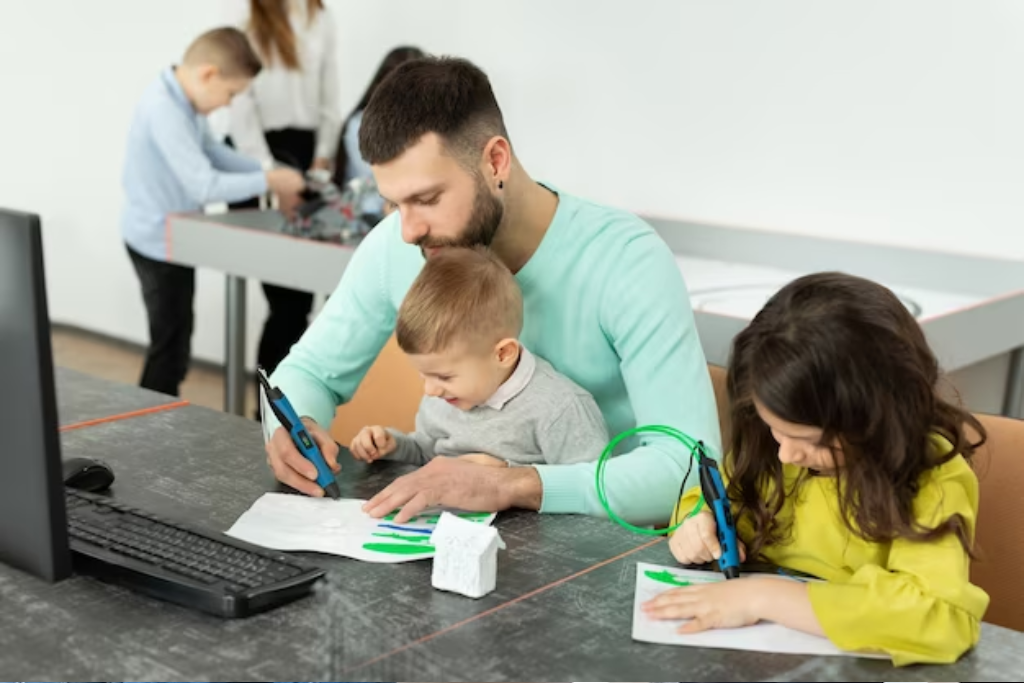Welcome, parents and educators! In this fast-paced world, it’s easy for the importance of parental involvement in a child’s education to get lost in the shuffle. But let’s not underestimate just how crucial your role is in shaping your child’s future.

At its core, parental involvement means being an active participant in your child’s educational journey, both at school and at home. When parents take an interest in and actively engage with their child’s learning experiences, incredible things can happen. From improved academic performance to enhanced social skills, the benefits are endless.
So today, we’re going to explore effective strategies and practical tips on how you can foster a strong partnership between parents and schools. We’ll also dive into ways you can continue supporting your little one’s educational growth beyond the classroom walls.
Let us embark on this exciting adventure together as we unlock the secrets to maximizing parental involvement in your child’s education!
The Importance of Parental Involvement in Education
When it comes to a child’s education, parental involvement is not just beneficial; it’s essential. Studies have consistently shown that children whose parents are actively involved in their learning tend to perform better academically and have higher levels of motivation.

First and foremost, parental involvement helps create a strong foundation for academic success. When parents take an interest in what their child is learning at school, they can provide additional support and guidance at home. This collaborative effort between parents and educators ensures that the child receives consistent reinforcement of key concepts.
Furthermore, when parents are involved in their child’s education, it sends a powerful message: education matters! Children perceive their parents as role models, so seeing them prioritize education instills a sense of value and importance in learning.
Parental involvement also plays a vital role in fostering positive relationships between teachers and families. By actively engaging with teachers through parent-teacher conferences or volunteering opportunities, parents demonstrate their commitment to working together for the child.
In addition to these benefits for students themselves, schools also reap rewards from increased parental involvement. When families are engaged with the school community, there tends to be greater overall satisfaction with the educational experience. This leads to improved communication channels between all stakeholders, resulting in a more harmonious learning environment.
So let us remember: parental involvement isn’t just about attending meetings or signing permission slips; it’s about being an active participant in your child’s educational journey. Together, we can unlock endless possibilities for your little one’s growth and development, both inside and outside the classroom walls!
Tips for Building Strong Relationships with Parents
Building strong relationships with parents is essential for fostering a positive and supportive educational environment for children. Here are some tips to help educators establish strong connections with parents:
Open lines of communication are crucial. Regularly communicate with parents through various channels, such as emails, newsletters, or parent-teacher conferences. This will keep them informed about their child’s progress and any upcoming events.

Show genuine interest in the parents’ perspective. Listen actively during conversations and meetings, allowing them to share their concerns or ideas freely. Respect their opinions and involve them in decision-making processes when appropriate.
Create opportunities for parental involvement. Encourage parents to volunteer in the classroom or participate in school activities like field trips or fundraisers. These experiences allow parents to feel engaged and provide valuable support for teachers.
Additionally, be proactive in seeking out feedback from parents. Surveys or questionnaires can help gather insights on how they perceive the school’s efforts and what improvements can be made.
Always express appreciation for parents’ involvement in their child’s education. Recognize their contributions publicly through newsletters or social media platforms. A simple thank-you goes a long way in building trust and maintaining positive relationships.
By implementing these strategies consistently over time, educators can build strong partnerships with parents that benefit both the students and the overall educational community.
Strategies for Getting Parents Involved at School
Building a strong partnership between parents and schools is crucial for the success of a child’s education. Here are some effective strategies to encourage parental involvement at school:
- Open Communication Channels: Establish clear and open lines of communication with parents. Utilize various platforms, such as emails, newsletters, and social media, to keep them informed about school events, policies, and their child’s progress.
- Parent-Teacher Conferences: Schedule regular parent-teacher conferences to provide an opportunity for face-to-face discussions. These meetings allow parents to gain insight into their child’s academic performance and address any concerns or questions they may have.
- Volunteer Opportunities: Create volunteer programs that cater to the different schedules and interests of parents. Encourage them to participate in activities such as classroom assistance, field trips, library support, or organizing fundraisers.
- Workshops and Seminars: Organize workshops on topics like parenting skills, study techniques, or navigating online learning platforms. This equips parents with valuable tools to support their child’s learning journey.
- Collaborative Projects: Engage parents in collaborative projects where they can contribute their expertise or resources in areas like arts and crafts projects or career fairs.
By implementing these strategies effectively, schools can foster a sense of community while empowering parents to play an active role in shaping their child’s educational experience
Ways to Engage Parents in Their Child’s Learning at Home
- Create a positive and supportive environment:
Encourage parents to create a dedicated space at home for studying with minimal distractions. This can help foster a positive learning environment that promotes focus and concentration. - Share resources and tools:
Provide parents with educational resources, such as online platforms or apps, that they can use to support their child’s learning at home. These tools can offer interactive activities and exercises tailored to different subjects and grade levels. - Set clear expectations:
Communicate clear expectations regarding homework assignments, projects, and deadlines. Providing parents with this information helps them understand what is expected of their child academically and enables them to provide the necessary support. - Regular Communication:
Establish regular communication channels between teachers and parents through newsletters, emails, or parent-teacher conferences. This ensures ongoing collaboration between educators and families, allowing for updates on progress or addressing any concerns. - Encourage parent involvement in homework:
Encourage parents to actively engage in their child’s homework routine by reviewing assignments together or helping with challenging tasks when needed. - Celebrate Achievements:
Recognize the accomplishments of students both inside and outside the classroom by sharing positive feedback regularly with parents via notes or phone calls. - Provide opportunities for parent education.
Offer workshops or webinars focused on strategies for supporting children’s learning at home.
Parents may benefit from gaining insights into effective study habits, scheduling techniques, and ways to promote critical thinking skills.
Encouraging parental involvement is crucial for enhancing student success.
Sustained engagement leads not only to improved academic performance but also fosters a sense of community within the school setting.
When schools facilitate strong partnerships with families, it contributes significantly towards creating an enriching educational experience overall.
This collaborative approach nurtures well-rounded learners who are motivated, self-directed, and equipped with essential life skills.
Knowing how vital it is, it becomes imperative to overcome any challenges or barriers that might hinder parental involvement.
Benefits of Parental Involvement for Students and Schools
One of the most significant benefits of parental involvement in a child’s education is improved academic performance. When parents actively participate in their child’s learning journey, they can provide support and encouragement, which fosters a positive attitude towards academics. This increased engagement often leads to higher grades and better overall educational outcomes.

Additionally, parental involvement helps promote a sense of accountability and responsibility in students. When parents are involved in their child’s education, students understand that their academic success matters to someone who cares deeply about them. This understanding motivates them to take ownership of their learning and strive for excellence.
Moreover, parental involvement has been linked to increased attendance rates at school. When parents are engaged with their child’s education, they become more aware of important school events such as parent-teacher meetings or extracurricular activities. As a result, children feel supported by their parent’s presence and are less likely to miss out on these valuable opportunities.
Furthermore, when parents actively participate in their child’s schooling experience, it enhances communication between home and school. Regular communication allows teachers to gain insights into each student’s unique needs and challenges outside the classroom setting. With this information, educators can tailor instruction accordingly and address any concerns promptly.
In addition to benefiting students individually,
Parental involvement also positively impacts schools as a whole.
When there is strong collaboration between home
and school environments,
It creates an inclusive community where everyone works together for the common goal of providing quality education.
Parents can contribute valuable perspectives.
Ideas,
and resources that enrich the overall educational experience.
Their active participation also shows support for teachers
and reinforces the importance of education in society.
Overcoming Challenges and Barriers to Parental Involvement
While parental involvement in their child’s education is essential, it can sometimes be challenging to get parents engaged. Various barriers may hinder their participation, such as language barriers, busy schedules, or a lack of understanding about how they can contribute effectively. However, with the right strategies in place, these challenges can be overcome.

One way to address language barriers is by providing translated materials and bilingual staff who can communicate with non-English-speaking parents. This ensures that all parents have access to important information and feel included in their child’s education.
Another common barrier is busy schedules. Many parents work long hours or have other commitments that make it difficult for them to attend school events or meetings. To accommodate this, schools can offer flexible meeting times or alternative ways for parents to stay involved, such as through virtual meetings or online platforms.
It’s also crucial to provide clear communication about how parents can contribute effectively. Some parents may not know what specific actions they can take at home or within the school community. By offering guidance and suggestions on how they can support their child’s learning journey, you empower them to play an active role.
Schools should also consider incorporating technology into parental involvement initiatives. Online platforms and apps allow for easy communication between teachers and parents regarding assignments, progress updates, and upcoming events. This helps bridge the gap between home and school while accommodating modern lifestyles.
Fostering a welcoming environment is key to overcoming barriers to involvement. When families feel valued and respected within the school community, they are more likely to participate actively in their child’s education journey.
Parental involvement fosters stronger relationships between families and schools while positively impacting students’ educational outcomes. By building strong partnerships with parents based on trust and open communication channels both inside the classroom walls and outside of them, we will see children thrive academically!
